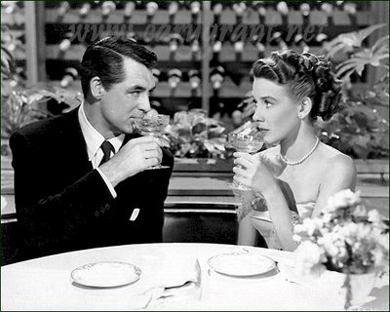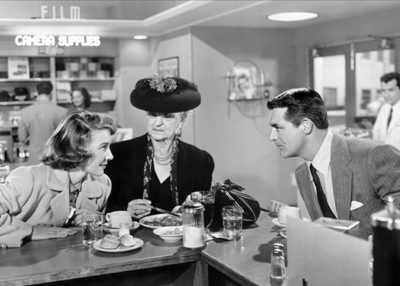
 |
|
|
|
The interesting Betsy Drake isn't mentioned much any more, but after being introduced to her last year in the amusing Warners show Pretty Baby, I wanted to see one of her debut picture, 1948's Every Girl Should Be Married. Betsy Drake made only nine feature films, yet she seems to personify a vision of 1950s American womanhood that certainly was in force when I was a child. Drake's screen persona is of an outgoing, outspoken optimist concerned mostly with her own advancement -- in a socially acceptable way, of course. She dresses as if expecting at any moment to meet Mr. Right. Her mind is focused on positive values, to the point of imposing them on others -- in a nice way, of course. She holds no extreme opinions and has only the greater good in mind ... that, and a personal entry into the new era of consumer blessings. 
My mother came from a slightly earlier wartime background but many of my schoolteachers in the 1950s seemed to be from the same Betsy Drake mold -- upstanding young women with bright smiles and affection for all (or so it seemed). By the time I was trying to date their daughters in the late 1960s I saw the other side of the coin. These women stage-managed the personal lives of their children both on dates, and in life in general. I ran into at least two situations where I had more interaction with the mother than the daughter. Anything I told the girl, the mother knew, which could get particularly sticky for a young man's love life. I was checked out and often found wanting, as I didn't exude varsity spirit and my interest in film didn't slot me as appropriate serious boyfriend material. And this was with girls fifteen years of age. Meet young Savant, "safe" starter boyfriend material. 1 But back to Ms. Drake, whose spirited Anabel Sims in this show is, depending on one's point of view, a prototype '50s domestic dream girl or a monster. Produced, directed and co-written by Don Hartman, the movie doesn't pull any punches with its direct message. Feminists should look first before spitting blood at the film's retro-active title, as Every Girl Should Be Married is so up front about its theme that it makes an excellent conversation (or argument) starter. Penniless department store clerks Julie Hudson and Anabel Sims (Diana Lynn & Betsy Drake) want to escape their 9 to 5 misery by finding perfect husbands. Anabel is desperate not to return to her "Old Joe" back in her hometown. She thinks her ship has arrived when she bumps into Doctor Madison Brown (Cary Grant), a prominent professional who loves babies! Against Julie's advice Anabel initiates a major campaign that could be titled Learn Everything About Madison Brown And Magically Cross His Path At Every Opportunity. Anabel meets Brown on the street, in a diner, and in a fancy restaurant when she pretends to be the girlfriend of the owner of her department store, Roger Sanford (Franchot Tone). She gets in trouble for "borrowing" a gown from the store but Sanford begins pursuing her as well, complicating matters. Worse, Madison soon realizes that Anabel is contacting everyone he knows, to beg them to put in a good word for her. This leads to one embarrassing situation after another, yet Anabel never gives up, convinced as she is that Madison will see the light and carry her off like Prince Charming. Is Anabel a smart cookie refusing to be a passive player in her life decisions, or is she a foolish idiot throwing herself at a man put off by her full court press? 
Although Betsy Drake only merits fourth billing in her debut, she's the whole picture here, coming off as a polished product instead of a wannabe actress. All Cary Grant has to do is play coy and hard to get. We get the definite impression that it's Ms. Drake's personal power and not the character as written that provides Every Girl Should Be Married with it forcefulness. Is this emancipation, or is it the birth of Momism? Franchot Tone is putty in Anabel's hands, the normally vibrant Diana Lynn looks positively subdued, and even Cary Grant defers to Drake's steamroller matrimonial campaign. The big surprise is that that we don't recoil like startled animals and run for our lives. Drake is a charming original; her Anabel expresses the unvoiced inner needs of many of the girls I met in the 1960s that considered advantageous matrimony to be the answer to life's every question. Anabel isn't really an exaggeration. She simply has the nerve to go for what she wants in life. She's brash but independent-minded. She has inner strength, and that's always attractive to any reasonably secure man. Although a feminist-minded viewer might object to Anabel's fixation on matrimony as her only goal, Anabel makes a great crusader for the abandonment of the double standard: she stands right up and protests the notion that only men are allowed to aggressively pursue their chosen mates. Ms. Sims is a both a conformist and a revolutionary.
The auteur of Every Girl Should Be Married wisely tailored the film for its cast, because his script rips off several earlier comedy hits, screwball and otherwise. The fact that Anabel works for a department store and becomes the fake girlfriend of its playboy owner comes straight from Garson Kanin and Norman Krasna's Bachelor Mother. There's even a verbal reference to ducks at the counter where Anabel works, and a run-in with her department's floorwalker. The idea that Anabel would be bombarded with lavish offers (a car, a house) is a blatant borrowing from
Every Girl Should Be Married is an item of its time. Today's viewers may not feel that the problems of its female protagonist are still current... but the truth is that everything old is still new. The show is funny, Betsy Drake plays beautifully opposite her soon-to-be spouse Cary Grant (at his most engaging) and the overall relevance of the comedy is still highly debatable. Think of it as Mad Men: The Early Years. 
The Warner Archive Collection DVD-R of Every Girl Should Be Married is a good encoding of this RKO release, reportedly the studio's biggest moneymaker of 1948. The print is in fine shape. Did this film drop out of sight because it was thought to be dated? Did Betsy Drake at some point become drastically unfashionable? Perhaps it got lost in the "classic movie shuffle" because of its derivative script, or the fact that it wasn't made by a confirmed Hollywood master. I thought it was unusually good.
On a scale of Excellent, Good, Fair, and Poor,
Every Girl Should Be Married rates:
Footnote:
1. Now, getting around the mothers ... that's what life is all about.
Reviews on the Savant main site have additional credits information and are often updated and annotated with reader input and graphics. Also, don't forget the 2010 Savant Wish List. T'was Ever Thus.
Review Staff | About DVD Talk | Newsletter Subscribe | Join DVD Talk Forum |
| ||||||||||||||||||